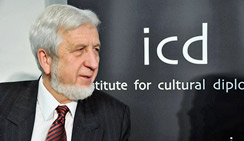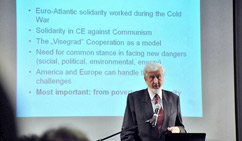The Berlin International Economics Congress
An Interdisciplinary Analysis of the Roles of Global Politics & Civil Society in International Economics


Prof. Dr. Géza Jeszenszky
Former Hungarian Foreign Minister, Former Hungarian Ambassador to the United States
Born in Budapest in 1941. Due to his commitment to the Hungarian Revolution of 1956 was banned from higher education for two years. From 1961 read history, English, and later library science at Eötvös University, Budapest, receiving an M.A. in 1966, a Ph.D. in 1970, and a degree in librarianship in 1973.
After two years as a schoolteacher he joined the National Széchényi Library in 1968. In 1976 he was invited to teach at the Budapest (then Karl Marx) University of Economics, where he was appointed reader in the history of international relations in 1981 and was elected Dean of the School of Social and Political Science in 1989. Between 1973 and 1976 he held a research scholarship from the Hungarian Academy of Sciences at the Institute of History in Budapest. In 1980 he received the degree „Candidate of Historical Sciences” from the Hungarian Academy of Sciences. Dr. Jeszenszky is the author of a large number of scholarly publications and political writings, including An Outline History of International Relations (Budapest, 1984); Az elveszett presztízs [The Changing Image of Hungary in Britain,1894-1918]. (Budapest, 1986, 2nd ed. 1994); Antall, József: Selected Speeches and Interviews. Ed. by Géza Jeszenszky. Budapest: József Antall Foundation, 2008; Post-Communist Europe and Its National/Ethnic Problems (Budapest, 2009), articles in The East European Quarterly, Ethnos, Macalaster International, The Hungarian Quarterly, The New York Review of Books, Uncaptive Minds, Südosteuropa, as well as in journals and collective volumes published in Hungary, the United States, the U.K. and Germany.
Jeszenszky taught courses on the history of international relations, modern Hungarian history, esp. foreign policy, on Central and Eastern Europe (the Habsburg Monarchy, the problem of national minorities) and on the transition process in the formerly Communist-dominated countries in the 1990s. In 1984-86 he was a visiting professor at the University of California, Santa Barbara, teaching the history of Central and Eastern Europe; in 1996 was Helen De Roy Professor at the University of Michigan, Ann Arbor.
Jeszenszky was a founding member of the Hungarian Democratic Forum (1988), which won the free elections in April 1990, nominating him Minister for Foreign Affairs in the government of J. Antall (1990-94).
As Minister, Jeszenszky made a personal contribution to the dismantling of the Warsaw Pact and to the reorientation of Hungary's foreign policy. Dedicated to the idea of regional cooperation he helped establishing and maintaining the „Visegrád” cooperation of the restored Central European democracies. He negotiated bilateral treaties with Hungary's three neighbors, Ukraine, Slovenia and Croatia, countries who were ready to provide guarantees for the rights of their sizeable Hungarian population.
Following the elections of 1994 Jeszenszky became a member of the Opposition in Parliament. In 1995 he was elected President of the Hungarian Atlantic Council, a post he gave up when, following another change of government, he was appointed Ambassador to the United States of America. He served in Washington between 1998 and 2002, representing the government led by V. Orbán. In September 2002 he resumed teaching history and international relations at the Corvinus University of Budapest (formerly Budapest University of Economics and Public Administration). Recently, as a Visiting Professor, he also taught courses on the history and problems of Central Europe at the College of Europe, Warsaw-Natolin, at Pacific Lutheran University (Tacoma, WA) and at the Babes-Bolyai University at Cluj-Napoca/Kolozsvár in Romania.
In his dual capacity as a scholar and a politician Dr. Jeszenszky talked or read papers at numerous conferences, including the American Association for the Advancement of Slavic Studies, the Council on Foreign Relations, the CSIS (Washington, D.C.), the American Hungarian Educators’ Association, the Konrad-Adenauer-Stiftung, the Friedrich-Naumann-Stiftung, the Institute Francais des Relations Internationales, the Atlantic Council of the United States, and spoke at a large number of universities all over the world. Several timers he was a speaker at the NATO School (SHAPE) at Oberammergau, Germany.
Jeszenszky received a number of decorations and awards including a C.I.E.S. Fulbright Grant (1984-86) and a Guest Scholar Grant from the Woodrow Wilson International Center for Scholars (1985). He is also recipient of several high state decorations from Italy, Spain, Poland, Slovenia, Croatia, Korea etc.
Dr. Jeszenszky is married, has a son and a daughter. He is an active sportsman, his favorites are skiing, rowing and mountaineering. He is the President of the Hungarian Carpathian Association.






















































































